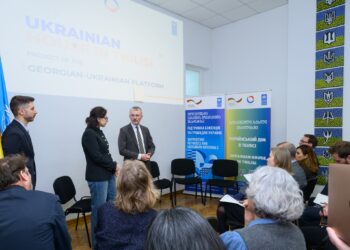“We shouldn’t make the same mistake this spring. If we see an increase in confirmed cases after loosening the regulations, the government should listen to the epidemiologists.” – Bidzina Kulumbegov.
It all started on February 26, 2020, when the first case of COVID-19 was confirmed in Georgia. Followed by a binge of panic-buying, lockdowns, social distancing, and multiple other regulations, over 262,000 people have been infected in the country to this day. Face masks and hand sanitizers became essential parts of everyday life, we are still getting used to working and studying from home, and most people think twice before deciding to hug their loved ones.
While COVID-19 vaccines have been introduced and authorized in an unprecedentedly short amount of time, the vaccination is yet to kick off in Georgia. The country is expecting the vaccine rollout to begin by the end of February, starting with the immunization of medical staff. Since there are numerous questions and misconceptions surrounding the vaccine and the process of vaccination itself, we decided to interview renowned Georgian allergist/immunologist Bidzina Kulumbegov, who thoroughly discussed the issues regarding COVID-19 vaccination and the epidemic situation in the county.

How would you assess 2020? Did Georgia manage to effectively handle the pandemic?
Initially, the virus was not taken seriously in the world. However, the National Center for Disease Control and the Government of Georgia took appropriate steps to prevent the expansion of the virus from the very beginning. The introduction of thermal screenings at the airports and similar regulations ensured a manageable epidemic situation by spring. Since we were dealing with a new infection, its treatments were refined only by summer, which gave us time to learn from the mistakes of others. On the other hand, I think the initial stability made us think that we had defeated the virus, and people decided they could safely return to their old lifestyles. Moreover, political processes and the parliamentary election campaigns added to relaxed regulations, resulted in a worsened epidemic situation by October.
What would you point out as the biggest challenge for our healthcare management?
The biggest challenge, of course, was that too many patients got infected at the same time. To be honest, we faced many logistic problems, such as ambulances arriving late. Western countries like the US, Great Britain and Belgium also experienced similar shortcomings. However, while our healthcare system faced its limitations, our medical personnel persevered. Even though we had more hospitalizations than many European countries, the introduction of COVID hotels also helped. That’s why I believe that the medical sector overcame its struggles in a worthy manner.
What is the most important lesson learned from the epidemic crisis?
When the expansion of a virus starts, we should learn that the limitation of mobility and wearing face masks are two of the most important preventive measures. We saw a dramatic increase of COVID-19 cases in Batumi by the end of August. Had we closed the Adjara region before then, I think we wouldn’t have faced the worsened epidemic situation later in Tbilisi and the rest of Georgia. That’s why we shouldn’t make the same mistake this spring. If we see an increase in confirmed cases after loosening the regulations, the government should listen to epidemiologists more.
What is your Pandemic forecast for 2021? Do you feel more optimistic about the upcoming year?
I certainly feel more optimistic about 2021, for several reasons. First of all, over 100 million people have already been vaccinated in the world. In Georgia, we are expecting to receive 700 thousand doses of vaccine from the COVAX platform. However, our ambition is to immunize at least 60% of the Georgian population. That’s why we need bilateral negotiations with countries that bought more doses than they actually needed. Secondly, seasonal changes somehow affect the spread of the virus, and if we manage to vaccinate many people during spring and summer, it will win us time before autumn.
What kinds of vaccines are available in the world today?
There are four types of COVID-19 vaccines: protein vaccines such as Novax, viral vector vaccines (Oxford/AstraZeneca), genetic vaccines (Pfizer, Moderna), and inactivated vaccines (Sinovac). Some of them have already been authorized, while others are still under medical trials. The Pfizer vaccines, which are expected to arrive in Georgia by the end of February, have proved to be 95% effective.
Since COVID-19 vaccines were created in an extremely short time, many people are skeptical about their effectiveness and safety. What would you say to them?
I would tell them that it’s true that COVID-19 vaccines were created in the shortest amount of time in the history of medicine. However, we should take into consideration the financial resources mobilized to create this vaccine. In addition, lots of people were motivated to participate in clinical trials. Additionally, all the respectable companies that worked on the vaccines declare that there have been no compromises made regarding safety parameters. Multiple studies point out that these vaccines have no fatal or damaging results on the human body.
If a person is allergic, is it safe for them to receive the Coronavirus vaccine?
The Pfizer and Moderna vaccines do not include the famous allergens present in traditional vaccines, such as glair, gelatin, and latex. However, another allergen, known as polyethylene glycol (PEG) was a necessary ingredient in the preparation of these vaccines. It is generally recommended that if the person is allergic, they should still get vaccinated, but should remain under medical supervision for 30 minutes after getting their shots. If they have an allergic reaction within those 30 minutes, they shouldn’t receive the second dose later.
Is it possible to vaccinate an already infected patient?
They don’t vaccinate infected patients, and the recovered ones can get their shots about three months after their health is restored.
What can the long-term contraindications of the vaccines be?
Any kind of contraindications will be revealed within a month after getting the shot. However, all documented side effects have proved temporary and manageable so far. Local reactions like arm pain, tiredness and headaches might show up, but they will be gone within 24-48 hours.
There have been numerous cases when the contacts of COVID-19 patients didn’t contract the virus. How might this be explained?
It can be explained with several factors. There is a hypothesis that some people have a receptor system which doesn’t let the virus infect the body. Such people can be categorized as COVID-resistant. There is ongoing research to determine what contributes to such resistance. The second aspect might be that if a person gets infected, their family members start to act more carefully by keeping distance and wearing face masks. The Coronavirus is characterized by the minimal infective dose, meaning that only a number of viral particles are needed in order for someone to get infected.
A single case of one of the new COVID-19 strains was confirmed in Georgia a while ago. Is there a risk of its spread in the country?
Since we still don’t have many arrivals from foreign countries, the risk is currently rather small, but after the regulations are loosened, that risk might increase.
What about cases of reinfection?
There has been no documented case of reinfection in Georgia so far. On a global scale, this issue still remains vague. It is currently thought that 1 in 1000 COVID-19 patients might contract the virus for the second time. People who have recovered from Coronavirus are left with strong immunity to it for at least 6 months. This gives us hope that the chance of reinfection is very low.
As an allergist, you have many child patients. In your opinion, how does long-term isolation from their peers affect their health and development?
It is a very serious problem. If children are allergic, too much time spent indoors might actually worsen their condition. That’s why all medical experts recommend governments to open schools and educational facilities as soon as the pandemic situation improves.
What do you think about the current regulations in the country?
The regulations should gradually be loosened. On the other hand, there are regulations which help in the management of the pandemic, but really damage the well-being of our society. I would point out the importance of municipal transport. People who don’t have their own cars, were somewhat paralyzed in this situation. That’s why the country should do everything to prevent the closure of municipal transport in the future.
Exclusive interview by Tiko Zurabishvili














